- Home
- Helen Black
Twenty Twelve
Twenty Twelve Read online
Helen Black grew up in Pontefract, West Yorkshire. At eighteen she went to Hull University and left three years later with a tattoo on her shoulder and a law degree. She became a lawyer in Peckham and soon had a loyal following of teenagers needing legal advice and bus fares. She ended up working in Luton, working predominantly for children going through the care system. Helen is married to a long-suffering lawyer and is the mother of young twins.
Praise for Blood Rush
‘With its sharp narrative and grittily realistic depictions of drug use, violence, street vernacular and the effects that these things have upon families and society, this is a novel that certainly has an impact . . . a really thought-provoking and different read.’
Crime and Publishing
‘A very readable contemporary crime thriller with a leading lady surely destined for primetime.’
Pulse
‘As ever, Black has produced a gripping tale of crime and judgement . . . it’s only a matter of time before Lilly Valentine makes it to the small screen.’
The Bookbag
Also by Helen Black
Damaged Goods
A Place of Safety
Dishonour
Blood Rush
TWENTY
TWELVE
HELEN BLACK
Constable & Robinson Ltd
55–56 Russell Square
London WC1B 4HP
www.constablerobinson.com
First published in the UK by Robinson,
an imprint of Constable & Robinson Ltd, 2012
Copyright © Helen Black, 2012
The right of Helen Black to be identified as the author of this work has been asserted by her in accordance with the Copyright, Designs and Patents Act 1988
All rights reserved. This book is sold subject to the condition that it shall not, by way of trade or otherwise, be lent, resold, hired out or otherwise circulated in any form of binding or cover other than that in which it is published and without a similar condition including this condition being imposed on the subsequent purchaser.
This is a work of fiction. Names, characters, places and incidents are either the product of the author’s imagination or are used fictitiously, and any resemblance to actual persons, living or dead, or to actual events or locales is entirely coincidental.
A copy of the British Library Cataloguing in
Publication Data is available from the British Library
ISBN: 978-1-84901-475-5 (paperback)
ISBN: 978-1-78033-019-8 (ebook)
Printed and bound in the UK
1 3 5 7 9 10 8 6 4 2
For Andrew
Acknowledgements
This book has been a collaborative effort, as ever, and I owe a debt of gratitude to, if not a cast of thousands, then certainly more than a handful.
My first thanks go to my readers. This is the first book that doesn’t feature Lilly Valentine. Thank you for giving me the space for this project.
Next up, a shout out to the Buckman gang. Watching my back of course.
Then everyone at Constable & Robinson. Thank you for letting me take this journey. The next one’s a Lilly, honest.
Once again a huge cheer for Lynne McA. Her knack of getting to the heart of what I’m trying to say is uncanny.
To Jon G: massive thanks for advice on all things technical. Why a luddite like me tried to incorporate so much techie stuff is a mystery, but your insights sparked so many ideas, what’s a girl to do?
Finally, as always, the biggest dollop of gratitude must go to my family without whom none of this would be possible or have any point.
‘Sweet baby Jesus.’
Officer George Stanley wiped a fat sweaty hand across a fat sweaty face.
‘Go back to the cruiser and get me a beer from the trunk,’ he growled.
Nathan Shaw hesitated. George was the senior officer. Hell, Nathan was barely out of the academy, but drinking on duty?
‘Did you hear me, boy?’ George shaded his eyes against the sun’s dazzle and frowned.
Nathan shrugged and scrambled up the dusty bank to where the cruiser was parked out of view. He popped the trunk and found a plastic icebox nestled between the first aid kit and a carton of surgical gloves. He lifted the lid and let his hand graze the bottles inside. The cold glass was delicious against the pink heat of his skin.
‘Get yourself one,’ George called.
Nathan smiled. One beer wouldn’t hurt. And anyways, who would ever know out here in the August heat? Carefully, he closed the trunk and headed back to George, a Bud in each hand.
George acknowledged him with a nod and reached into his pocket for a bottle opener. ‘Always be prepared,’ he said.
Nathan forced a chuckle and took a long swig. The condensation on the glass had wet his hand and when he lowered himself to the ground, the gritty earth breadcrumbed his thumb, like a chicken tender. He rubbed it against his trouser leg.
‘Goddamn waste of time.’ George held the Bud against his cheek.
Nathan didn’t argue. They’d been here swatting flies and stinking like snakes for six hours straight. He peered at the deserted yard of the Pearsons’ farmhouse. ‘Are they even home?’ Nathan asked.
‘Ain’t no telling,’ said George. ‘Reckon Tobias and the boys left before sun up.’
‘What about the wife? And the little kids?’
George drained the last of his beer with a sigh. ‘Probably inside.’
‘Doing what?’
‘Cooking, praying, who knows?’ said George. ‘And more to the point, who cares?’
Nathan squinted through the white heat at the shutters, bleached by the sun and closed tight. ‘The Chief thinks they might have illegal weapons in there,’ he said.
‘The Chief thinks a lot of things.’
‘You don’t believe it?’ asked Nathan.
George blew across the mouth of his empty bottle, the air making one long sad note. ‘Ain’t about what I believe; it’s about what I know. And what I know is that the Pearsons are God-fearing folk who’ve kept themselves to themselves for the last fifteen years.’
Nathan chewed his lip. George was old school. Voted for Dubya and his daddy before him. If a body didn’t bother him, he saw no reason to bother them. But as far as Nathan could see it, illegal guns and children didn’t have any business being together.
‘I don’t see why we couldn’t just knock on their door and ask ’em,’ he said.
George let out a hoot like an owl. ‘And what would you have done if they didn’t want to talk to you?’
‘Well I don’t know.’ Nathan scratched his chin. ‘I reckon that would have made me suspicious enough to go back to the station for a warrant. To have a look-see around the place.’
‘Uh huh,’ said George. ‘And do you know how to get one of those warrants?’
‘Not rightly.’
‘Let me tell you, boy, they don’t hand ’em out like Christmas cards. You gotta show reasonable cause. You gotta show ev-i-dence.’ George spread his arms out wide, to take in their dusty hideout overlooking the farmhouse. ‘And that is why we are here.’
Nathan turned and scanned the yard once more. In six hours no one had been in and no one had been out. The scene was freakishly quiet.
‘I don’t get it,’ he said. ‘The Chief must be expecting something to happen.’
George pulled at his collar with a doughy finger and breathed a gust of air down the gap.
‘Then answer me this. If there ain’t been nothing happening up here in fifteen years, what makes you think things are going to get crazy today?’
Chapter One
I hate hospitals.
I know everyone says that.
‘It’s the smell.’
Well, of course it’s
not.
I mean, I don’t actively like the smell of vomit masked by disinfectant; I wouldn’t, you know, swap my Chanel No. 5 for it. But I don’t loathe it in the way I loathe public swimming pools, or standing in queues, or people who let their dog stick his nose in your crotch and tell you he’s ‘only being friendly’.
If people are honest about what they truly dislike about hospitals, what makes them squirm, it’s the fear of all that pain and death so blatantly and proudly on show. Putting it bluntly, they’re shit scared.
With this cheery thought warming the cockles of my heart, you can imagine how delirious I am as I pull up outside High-fields Hospital for the Elderly and Terminally Ill.
‘Are you my mummy?’
I try not to wrinkle my nose at the old lady in the Winnie the Pooh nightdress and matching slippers.
She bares her hard pink gums at me. ‘Are you my mummy?’
I’m thirty-three and she’s a hundred in her stockinged feet. I try not to be offended.
I look around for a member of staff but, as usual, the place is like the Mary Celeste. Back at reception, three women sit behind a wooden desk festooned with fresh flowers and leaflets urging the aged to eat their five a day. They smile with their straight, white teeth.
‘Welcome to Highfields,’ they trill and direct you to the visitors’ area.
But once inside the belly of this beast, you get neither help nor smiles. Take this poor old lady, for instance; why haven’t her relatives complained? They can’t be happy that she’s left to wander the corridors stripped of her dignity and probably her knickers, can they? But what’s the alternative? Look after her themselves?
Fat tears well in her eyes. ‘Mummy?’
I shake my head and a blanket of hopelessness settles on her shoulders. She opens her mouth in a silent howl. For a second she reminds me of that painting by Edvard Munch.
‘Mummy, Mummy, Mummy,’ she chants, desperately grabbing my wrist in her bent and swollen fingers.
I try to prise her off but she’s surprisingly strong. ‘Could I get some help here?’ I call out.
No answer. Typical. How much does this place cost a week?
At last I spot a familiar figure stumbling out of a side room. He’s more bent than the last time I saw him. He leans more heavily on his walking frame.
‘Dad!’ I wave at him with my free hand. ‘Dad, is that you?’
He shuffles towards me, his breath exploding in raspy puffs. ‘Well it isn’t George bleedin’ Clooney.’
When he finally closes the distance between us, I am startled at the damage inflicted by the last two months in this hellhole. His hair, once thick and curly, is now so thin it barely covers his skull, revealing a smorgasbord of liver spots, moles and itchylooking warts. I berate myself for not visiting more often, for not being a better daughter.
‘What’s the matter?’ He peers at me. ‘Lost my youthful good looks, have I?’
‘You’ve lost weight,’ I reply.
‘If you saw the crap they serve here, you’d understand why.’
I don’t answer. The hospital email me their weekly menu detailing the delicious food on offer: chicken soup. Toad in the hole. Apple crumble.
‘Lord knows your mother couldn’t cook, but she’d make this lot look like Jamie bleedin’ Oliver,’ he says.
I smart at the mention of Mum and want to defend her lumpy cauliflower cheese, but I can’t do another argument. Instead, I nod at the old crone still attached to my arm.
Dad looks at his fellow patient with what might be pity or sorrow and leans in to her ear. ‘Piss off!’ he shouts.
The woman screams and scurries away like a beetle.
I’ve got to hand it to him; even a place like this can’t change my dad.
After the slow march back to Dad’s room, he settles on his bed. Sun streams through his window. In the glare he looks insectile, the thin sticks of his legs held at an odd angle, the skin of his hands as dry and papery as the wings of a dead moth.
He scowls at me. He hates being here as much as I hate visiting. The irony that this place is where he has ended up isn’t lost on either of us. After what he did to Davey, it’s almost a bad joke.
‘So what have you been up to?’ he asks.
‘Not much.’
I’m toying with him. I know what he wants but can’t resist the perverse pleasure of not giving it to him.
He raises an eyebrow, white whiskers sprouting at wild angles like a catfish.
I open my palms as if there is nothing to tell. Why do I do this? Torturing a shell of a man is pathetic.
‘I heard there’s going to be a reshuffle,’ he says.
He looks so eager, like a child waiting for a slice of birthday cake, hoping to get a bit with a sweet on it. The great Paddy Connolly, darling of the party, champion of the hardworking family, enemy of the unions, brought to this. Sniffing out scraps of gossip like a puppy.
I relent. ‘Davison is out.’
Dad nods. ‘About time. The man couldn’t get a hard-on in a brothel.’
‘They say McDonald will get the job.’
‘A move from Education to the Foreign Office.’ Dad whistles. ‘That Scottish bastard always was ambitious.’
I tell him the rest. Who’s in. Who’s out. Who has the PM’s ear. When the old man is satisfied that’s he’s exhausted the detail, he leans back against his pillow. He closes his eyes, so I drop my own little ingot into the conversation.
‘I’ve been offered something.’
His eyes open, instantly alert.
I hold my hand up to calm him. ‘It’s not much. Just a junior appointment.’
‘Everyone has to start somewhere. Even me,’ says the man who became the youngest ever cabinet minister.
I laugh, and for the first time in as long as I can remember he laughs too.
‘So where is it?’ he asks. ‘Health?’
I shake my head.
‘Defence?’ he says.
‘Don’t be daft.’
‘Education?’ He gives a throaty chuckle. ‘Spent some of the best years of my life in Education under Keith Joseph.’
‘It’s Culture, Media and Sport,’ I say.
Dad stops laughing.
‘I guess with my background it seemed an appropriate choice,’ I say.
‘Your background,’ he repeats.
I count to ten in my head. According to Dad, my background is one of politics and power, hailing, as I do, from stock so steeped in the business of government that one of my godparents was the chief whip of the party, the other, Chancellor of the Exchequer.
‘I meant my running, Dad,’ I say.
He blinks at me.
I try to keep the irritation from my voice. ‘I wasn’t bad at it, remember? In the 1996 Olympic squad.’
‘Yes,’ says Dad, but he’s no longer interested.
‘Actually, I’m pretty excited with the Games coming up. I think I can really bring something to the table.’
Dad doesn’t answer. He closes his eyes.
‘Try to eat more,’ I say and make for the door.
I slam the Mini Cooper into third, stamp on the accelerator and barrel down Shooters Hill Road, glad to put Blackheath and Dad behind me.
I can’t believe the old sod still has the ability to make me so angry. I’m a ten-year-old girl again, waving my medals under his nose, only to be asked why I don’t do something more constructive with my time than ‘a bit of bleedin’ running’.
A black cab pulls out in front of me and I press the heel of my hand against the horn. When I spot a tiny gap in the oncoming traffic I hit the gas and overtake, ignoring the cabbie’s proffered middle finger.
‘Your dad’s a hard man to please,’ my mum used to tell me, retrieving the medals from under my pillow.
‘I just want to make him proud,’ I said.
She wiped the tarnished brass against the leg of her trousers and gave me one of her slow, sad smiles. ‘You will, love, you will.’
She never learned that it didn’t matter whether she did the waltz, the twist or the bloody cha-cha-cha: Dad is never satisfied.
Well, not me. Not any more. I’m hanging up my jazz shoes.
When the leg gave way and all the doctors could do was shake their heads, I didn’t look for sympathy. My running career was over but I got on with my life, didn’t I?
The old man didn’t disguise the fact that he was relieved I’d stop pissing my life away on the track.
‘Mind you,’ he told me, ‘you’ll never make an MP. Too pretty, too indecisive.’
So I joined the civil service.
‘That’s who really run the show.’ Dad winked at me.
And he’s probably right, but I’ve hated every stinking minute of it. The hours, the egos, the backstabbing. Tepid glasses of wine while my smile breaks my jaw.
This job in Culture, Media and Sport is the first thing that has made my blood pump in a very long time. The chance to be involved in the 33rd Olympic Games – here, in London. My town. The chance to reach out and touch, if only fleetingly, something I love.
I force myself to inhale deeply, to exhale through my nose. I will not allow that man to spoil this. The world is bubbling with excitement and I’m going to be at the very heart of it.
‘I am calm,’ I sing out. ‘I am relaxed.’
Shit.
I miss my turn-off for Greenwich and end up in the sludge of Deptford’s one-way system.
Miggs was the last to arrive.
Steve and Deano were already in the kitchen, rooting in Ronnie’s fridge. Deano pulled out a carton of milk and sniffed it. ‘Fucking hell, this is minging.’
He catapulted it into the sink, which was already piled high with greasy dishes and empty takeaway cartons. It landed with a thud, spraying thick white lumps of cottage cheese over the fag ends and cold chips that littered the draining board.
Miggs swallowed down a pang of nausea. He’d stayed in some shitholes in his time but Ronnie’s spot was like a Glasgow crack house.

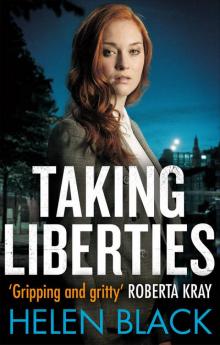 Taking Liberties (Liberty Chapman)
Taking Liberties (Liberty Chapman)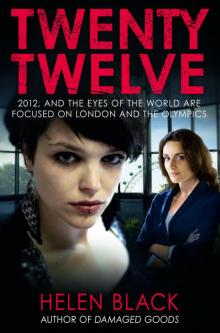 Twenty Twelve
Twenty Twelve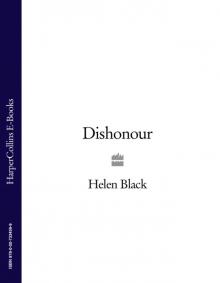 Dishonour
Dishonour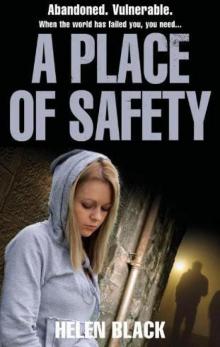 A Place Of Safety
A Place Of Safety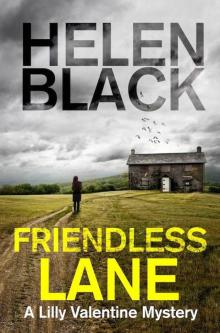 Friendless Lane
Friendless Lane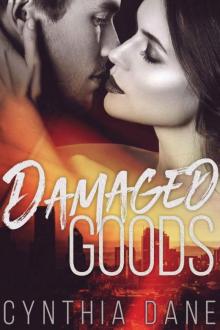 Damaged Goods
Damaged Goods